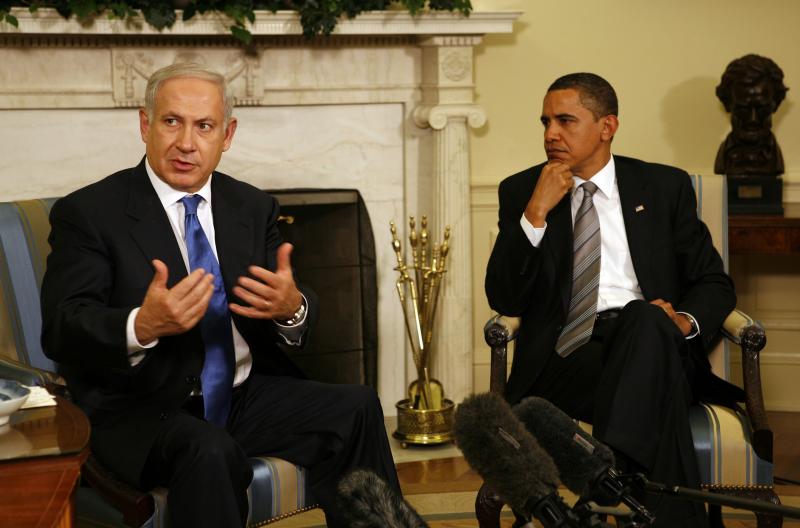
Obama and "Israel"

By Ali Rizk
US policy in the Middle East is highly associated with the staunch unconditional support for "Israel". However, it has become clear that the relationship between the Likud Prime minister Benjamin Netanyahu and incumbent Democrat president Barack Obama was, at its best uneasy.
 This culminated in a Netanyahu endorsement of Republican candidate Mitt Romney which led to loud objections from inside the US accusing Netanyahu of interfering in the American elections. Now, it could be stated that Netanyahu's nightmare has come true after Obama managed to get elected for a second term.
This culminated in a Netanyahu endorsement of Republican candidate Mitt Romney which led to loud objections from inside the US accusing Netanyahu of interfering in the American elections. Now, it could be stated that Netanyahu's nightmare has come true after Obama managed to get elected for a second term.
Obama came to the White House with a clear understanding that bitter relations with the Muslim world was unsustainable and that one of the factors that fuels anti-Americanism in the Muslim world was US favoritism towards "Israel".
Current CIA director David Petreaus famously said in a testimony to Congress that this favoritism was fueling anti-Americanism which was resulting in deaths of the American troops in the region. At the same time ,however, Obama realized that the decades long, institutionalized special relationship between the US and "Israel" could not be subject to changes or adjustments overnight. Obama hence embarked on a balancing act between promoting US interests in the Muslim world without altering the "unbreakable bond with Israel".
His attempted balancing act was evident from the start when he made his famous speech at Cairo university where he quoted the Holy Quran six times and stressed on the necessity of a halt to "Israeli" settlement activity. At the same time, however, he made repeated reference to the American-"Israeli" unbreakable bond and continued the traditional policy of equating the victim with the aggressor, accusing resistance movements like Hamas of practicing terrorism.
Further down the road, the "Israeli's" rebuffed the Obama administration with the famous announcement of new settlement activity that coincided with a visit by vice president Joseph Biden.
Eventually, Obama backed down to the Likud government in "Israel" amid pressures from pro-"Israeli" interest groups and members of congress, who's pro-"Israeli" inclination was famously revealed during a speech by Netanyahu where congress awarded him over ten standing ovations. The main factor thus which led Obama to give in was domestic pressure and the fear that this could cost him the 2012 elections.
Now, that these elections have taken place and Obama has secured his second term it is even more likely that he will once again embark on this balancing act (more likely because the Arab revolutions make it even more vital to make policy adjustments with the Muslim world). The killing of the US ambassador to Libya was a signal that anti-Americanism in the region is indeed alive and well during Obama's tenure and that a continuation of the status quo was carry severe consequences for the US.
 The question here is, now that Obama has nothing to fear with regards to his political career, will he back down from his balancing act due to "Israeli" pressures. It remains to be seen, and perhaps developments on the ground will have a say. But what is certain is that Netanyahu (if he himself is reelected in the "Israeli" elections in January) will not have the free hand he did over the past four years in rebuffing the Obama administration. This applies particularly to the last two years of Obama's second term, 2015 and 2016 after the mid-term congressional elections are held in late 2014.
The question here is, now that Obama has nothing to fear with regards to his political career, will he back down from his balancing act due to "Israeli" pressures. It remains to be seen, and perhaps developments on the ground will have a say. But what is certain is that Netanyahu (if he himself is reelected in the "Israeli" elections in January) will not have the free hand he did over the past four years in rebuffing the Obama administration. This applies particularly to the last two years of Obama's second term, 2015 and 2016 after the mid-term congressional elections are held in late 2014.
Just after Obama was declared the victor Netanyahu made an eye-catching statement saying that the "strategic alliance (between the US and "Israel") has never been stronger". Such a statement which echoes remarks made by "Israeli" war minister Ehud Barak do indicate that Netanyahu realizes the game has changed with a second term Obama presidency.
But this means that Netanyahu himself may be forced into a balancing act, albeit one that will be a lot more difficult than that of Obama's. The "Israeli" prime minister has tied his political mandate and agenda to militant approach towards Iran and preventing Iran from possessing Nuclear capabilities and NOT NUCLEAR WEAPONS.(recall the famous loony tunes diagram Netanyahu presented during his speech to the UN General assembly last September). If Netanyahu gives in to Obama and alters his hardline approach towards Iran and if he gives in to Obama and makes some concessions regarding "Israeli" settlement activity (even the slightest concessions) he then risks his right wing popular base which supports him precisely because of his hard-line approach.(This could lead to a substitute for Netanyahu like Avigdor Lieberman or people like the hard line deputy Knesset speaker Danny Danon).
On the other hand, if Netanyahu chooses a standoff with Obama he risks jeopardizing the US -"Israeli" alliance as his political opponents have warned and could lead these opponents to victory in the "Israeli" elections in January. These warnings are not related just to scoring domestic points in "Israeli" politics. They are also valid and realistic as a strike on Iran and, to a lesser extent a continued status quo in the "Israeli" Palestinian issue would be damaging to US interests and would not go down well with a second term Obama administration.
So, the balancing act syndrome has now infected Netanyahu it seems. And while Obama has taken a big step forward in his political career, the Netanyahu's balancing act may prove to be just too difficult and cost him his political career no matter in which direction he decides to go.
Source: moqawama.org



